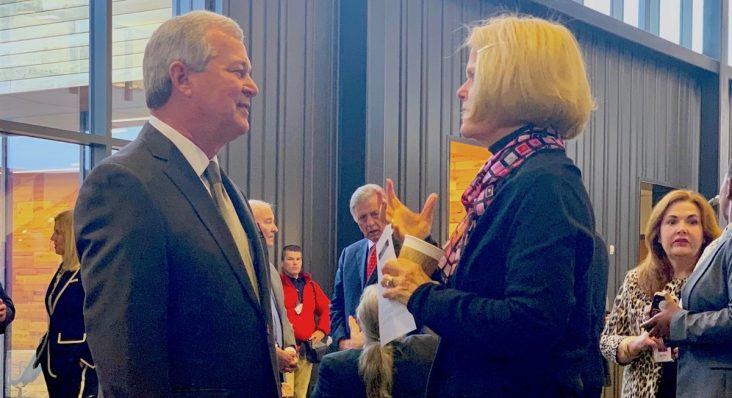Tyson Foods approves director slate, talks sustainability at annual meeting
by February 6, 2020 1:59 pm 1,440 views

Tyson Foods CEO Noel White visits with a guest at Thursday’s (Feb. 6) annual company meeting in downtown Springdale.
Tyson Foods Chairman John Tyson said he has fond memories of spending time on Emma Ave., in his hometown of Springdale, where his grandfather John W. Tyson and his father Don Tyson had a simple culture of taking care of people that dates back more than 80 years.
From those beginnings, Tyson Foods has grown into a multinational food company with 144,000 employees and revenue of $42.405 billion last year, according to the chairman who called the annual shareholder meeting to order in downtown Springdale on Thursday morning (Feb. 6). The meeting was held after the company posted fiscal first-quarter earnings.
It’s the third year the company has held the annual meeting downtown in its new offices located near where Tyson Foods originated. That space now represents the future of Tyson Foods with the new robotics and technology automation center as well as the space where Tyson Foods’ growing technology division is housed.
The business meeting was brief and sparsely attended outside of a few protesters posted across the street, Tyson employees and board members. With a quorum, shareholders elected the slate of directors to another one-year term with 84% of the votes. Tyson did not break out the votes for directors individually.
The slate of directors elected of this year are John Tyson, chairman; Gaurdie Banister; Dean Banks, president of Tyson Foods; former Arkansas Gov. Mike Beebe; Mikel Durham; Jonathan Mariner; Kevin McNamara; Cheryl Miller; Jeff Schomburger; Robert Thurber; Barbara Tyson and Noel White, CEO of Tyson Foods.
Shareholders also voted to approve compensation for officers with 91% of the vote as well as ratified the appointment of Ernst & Young as the company’s certified accounting firm.
The board heard from three shareholder groups who read proposals at the annual meeting. All three were rejected. A proposal for more transparency of the company’s lobbying brought by the International Brotherhood of Teamsters and was defeated, gaining only 14.65% of the vote. The American Baptist Home Health Association asked the company to provide a due diligence report on human rights citing several instances where workers were injured on the job as well as environmental risks to communities from toxic spills occurring at some of Tyson’s facilities. This proposal was defeated with just 14.58% of the votes. A third proposal that would require senior executives to retain a significant number of shares of Tyson Foods as part of the compensation. This was defeated with just 6.74% of voters approved.
John Tyson thanked the shareholder representatives for their participation and said the company answered its objections to those requests in its annual proxy filing with the Securities and Exchange Commission. In that filing, Tyson the company believes it is already addressing these issues in a satisfactory manner, providing details for each.
Independent Tyson shareholders are at a disadvantage at getting proposals passed because the company maintains a two-class share system which gives the Tyson family voting control of the company by a 10 to 1 margin over publicly-traded Class A shares. All of the Class B shares are held by the family.
Mighty Earth members protested outside the meeting in the bitter cold seeking to call attention to Tyson Foods’ lack of sustainability practices, namely water pollution. The group claimed Tyson Foods is not keeping its promises made two years ago to adopt sustainable farming practices on 2 million acres by 2020.
“It is clear we are in a planetary emergency and need rapid leadership from business to drive solutions. Tyson made a promise last year to fix polluting farming practices that are contaminating our waters and fueling climate change, and we are watching to make sure they deliver,” said Mighty Earth campaign director Lucia von Reusner.
The group claims meat production is the single largest source of water pollution in the U.S with runoff from fields being the primary source. Mighty Earth is calling on Tyson to only source animal feed from farms that protect soil health, minimize fertilizer usage, mitigate greenhouse gas emissions, and prevent excess runoff from dirtying the waterways, and also to significantly ramp up investments in plant-based proteins. The group said last month it launched a petition calling for Tyson to change its ways, and more than 50,000 people have signed it.
Tyson Foods CEO Noel White spoke about the company’s attention to improving sustainability at the annual meeting. He said the company has a long-standing commitment to sustainability and a track record of achievements. Most recently, the company enrolled 400,000 acres of row crop corn in its land stewardship initiative launched with the Environmental Defense Fund. The company is on track to meet its 2-million-acre goal by the end of 2020.
Tyson Foods also partnered with the World Resources Institute and is on track to reduce greenhouse gas emissions by 30% in the next 10 years through its supply chain. The company said it has reduced water use by 1.3 billion gallons since 2015 and continues to make progress on this commitment.
White said John R. Tyson, son of chairman Tyson, who was named the new chief sustainability officer in September, is focusing his work on helping the company support a more sustainable food system. Last month, Tyson Foods announced it would head up a global coalition for sustainable protein production. White said the coalition will focus on uniting the world’s most influential, food-focused stakeholders around a shared vision and purpose to increase sustainability throughout the food supply chain. He said the coalition is needed because the concerns are too large for one company to tackle alone.
